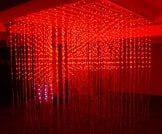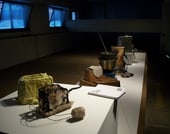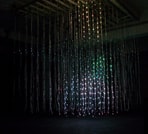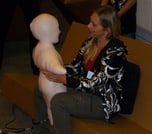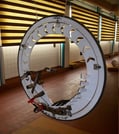Ars Electronica 2010
14.9.2010
For the first time, I visited the Ars Electronica Festival in Linz, Austria. It was quite interesting, altough i had hoped for more electronic art. With its motto "Repair" and the focus on the future of society, the festival got an extremly broad focus. There was some very interesting electronic art to see. But there was also a lot of things that where not art or even bleeding edge technologies like electric bycicles or solar panels. Don't get me wrong, I do think this technologies have to be part of a sustainable future. But I would expect that someplace with a large crowd, not at an art festival.
There was also some general "modern art" things I do not care about, like performances (so this guy strips naked and rolls over the floor, with a crowd of spectators watching. whatever. this girl lies in front of a screen showing some boring swarming animation. she does nothing, apparently for hours. how fascinating...).
My personal highlight was the The Toaster Project. The artist Thomas Thwaites decided he would try to build a toaster himself. Not with any new or scrap material but from the raw materials. He went to dig up iron ore and tried to get some raw oil and so on. With lots of compromises, he managed to build something that can roast your toast. It is yak shaving approach to get a toast roasted.
I think besides showing the complexity behind a simple and cheap device like a toaster, this project proves the power of collaborative working and of industrialization. The building materials get really cheap when produced in large amounts. I would assume that for each toaster model, quite a lot of man-hours are invested in the visual design, the assembly plan in the factory, technology and material optimizations and so on. But with the large number of items produced, the cost of this work is distributed until it becomes a tiny fraction of the end price.
My girlfriend liked best the Ocean of Light. A large cube of hanging stripes with LED lights and sound installation that interacts with the visitors. I agree with her that it was a nice experience to play with that ocean.
The most horrifying thing we both agree is the Telenoid project by Hiroshi Ishiguro. Some kind of skin-colored almost human-sized ghost you are supposed to cuddle when you are alone and have a phone call with friends or family. There is a lot of worry in Japanese culture on how carework for old people can be ensured when the age pyramid continues to get unbalanced. Maybe Japanese can really like a thing like the Telenoid - for us its just a frightening idea to have this as your "friend".
My personal highlight was the The Toaster Project. The artist Thomas Thwaites decided he would try to build a toaster himself. Not with any new or scrap material but from the raw materials. He went to dig up iron ore and tried to get some raw oil and so on. With lots of compromises, he managed to build something that can roast your toast. It is yak shaving approach to get a toast roasted.
I think besides showing the complexity behind a simple and cheap device like a toaster, this project proves the power of collaborative working and of industrialization. The building materials get really cheap when produced in large amounts. I would assume that for each toaster model, quite a lot of man-hours are invested in the visual design, the assembly plan in the factory, technology and material optimizations and so on. But with the large number of items produced, the cost of this work is distributed until it becomes a tiny fraction of the end price.
My girlfriend liked best the Ocean of Light. A large cube of hanging stripes with LED lights and sound installation that interacts with the visitors. I agree with her that it was a nice experience to play with that ocean.
The most horrifying thing we both agree is the Telenoid project by Hiroshi Ishiguro. Some kind of skin-colored almost human-sized ghost you are supposed to cuddle when you are alone and have a phone call with friends or family. There is a lot of worry in Japanese culture on how carework for old people can be ensured when the age pyramid continues to get unbalanced. Maybe Japanese can really like a thing like the Telenoid - for us its just a frightening idea to have this as your "friend".
